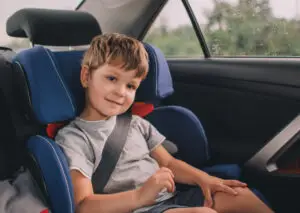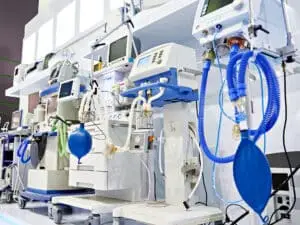Getting in a car accident can be a traumatic experience for any adult, let alone a child who may not be able to understand the extent of the situation fully. As adults, we can more accurately identify potential mental health problems and seek help to correct them. Children, however, may be wholly unaware of any psychological effects they might be experiencing after a car crash. Here are some of the most common questions about psychological injury to children after a car accident.
Can Car Accidents Cause PTSD in Children?
Yes, children can suffer from post-traumatic stress disorder (PTSD) after being involved in a car accident. A journal review from the European Journal of Psychotraumatology found that 38.3% of children involved in a car accident suffered from PTSD one month after the incident. The report also found that psychological injuries to children are often overlooked after a car accident, which leads to low rates of intervention in children suffering from mental health issues after an accident.
What Are the Symptoms of Psychological Trauma in Children Following an Accident?
Identifying PTSD or other psychological problems in children can be difficult because they usually do not have the awareness to communicate what they are going through. If you suspect your child may be suffering from mental health problems after a car crash, then look for the following common symptoms:
- A negative visceral reaction to cars. One of the biggest signs of suffering from PSTD from a car accident is having a negative reaction to cars. If your child gets upset, quiet, irritated, or is otherwise affected by getting in a car, then they might be suffering from PTSD.
- Regression in verbal abilities. Suffering a traumatic event can hinder a child’s developmental progress. If you notice that your child seems stuck or even regresses in their abilities, then it might be due to mental health issues.
- Anger. Dealing with a traumatic situation can be extremely frustrating for children as they often lack the ability to rationalize the situation. As a consequence, anger and lashing out are common side effects of dealing with mental health problems after an accident.
- Sleep disruptions. PTSD can complicate getting a full night’s sleep. Look for signs of sleep disruptions like inability to fall asleep, nightmares, bed-wetting, or waking up multiple times throughout the night.
- Depression and anxiety. PTSD is closely related to other mental health problems like anxiety and depression. Look out for signs of depression and anxiety such as sadness, lack of positive emotions, lethargy, self-harm, destructive behavior, fatigue, declining grades in school, and excessive complaining.
How Can Parents Support Their Children With PTSD After a Car Accident?
It can be extremely difficult for parents to see their children suffer through PTSD after a car accident. While many parents know how to deal with physical wounds and scrapes, it can be tough to know how to support your child when their mental health is in jeopardy. Here are some ways parents can be supportive of their children:
- Take your child to therapy. Just as adults can go to therapy to process intense emotional issues, so can children. If your child is dealing with the negative repercussions of a traumatic event like a car or bus accident, you should take them to see a licensed therapist with experience helping children with PTSD.
- Give your child ample space. Allow your child to express themselves and share their true feelings about the incident. Sweeping things under the rug and moving on too quickly may not give them enough chance to process everything. Remind your child that they can share their emotions about the incident at any time.
- Return to a normal routine. Return to a routine as soon as reasonably possible. Allowing your child to see their classmates and follow their old schedule may allow them to remember what life was like before the accident.
- Be patient. Working through PTSD after a car crash takes time, and you need to give your child enough time to overcome their emotions. The best thing you can do to support them is be attentive to their needs and reassure them that they will get through it.
- Take care of yourself. Finally, you should not neglect yourself if you were also involved in the accident. If you are suffering from mental health problems as well, then you should seek mental health support in order to be a good role model for your child.
What Should You Do If Your Child Has Been Involved in a Car Accident?
Being in a car accident can be incredibly stressful, but being involved in an accident with your child in the car can be even worse. If you were involved in a car accident with your child, here are a few things you should do:
- Seek medical attention. Even if not immediately obvious, many car accident injuries can be hard to diagnose in the minutes or hours immediately after the crash. Getting a physical evaluation after the crash will ensure that you get the medical attention you need and will leave a record that you can use if you decide to pursue compensation down the road.
- Monitor your child’s health. Even if your child gets the green light from the physician after the crash, some injuries like whiplash take a few days to manifest. Keep an eye out for signs of physical and mental problems for at least a couple of weeks after the crash.
- Seek a mental health evaluation. Getting a mental health evaluation from a licensed child therapist is one of the most important things you can do for your child after a car accident. Even if you suspect that your child’s mental health is fine, getting the green light from a licensed professional is always advisable.
Also, remember to keep track of what not to do when involved in a car accident.
Can You Recover Financial Compensation If Your Child Got PTSD From a Car Accident?
You may be able to recover compensation from a car accident if your child suffers from PTSD due to the negligence of another party. Even if your child did not suffer from physical injuries, you may recover compensation for noneconomic injuries from the car accident. This means that you could be eligible for compensation for damages such as:
- Medical treatment
- Therapy
- Emotional distress
- Medication
SOURCES:





